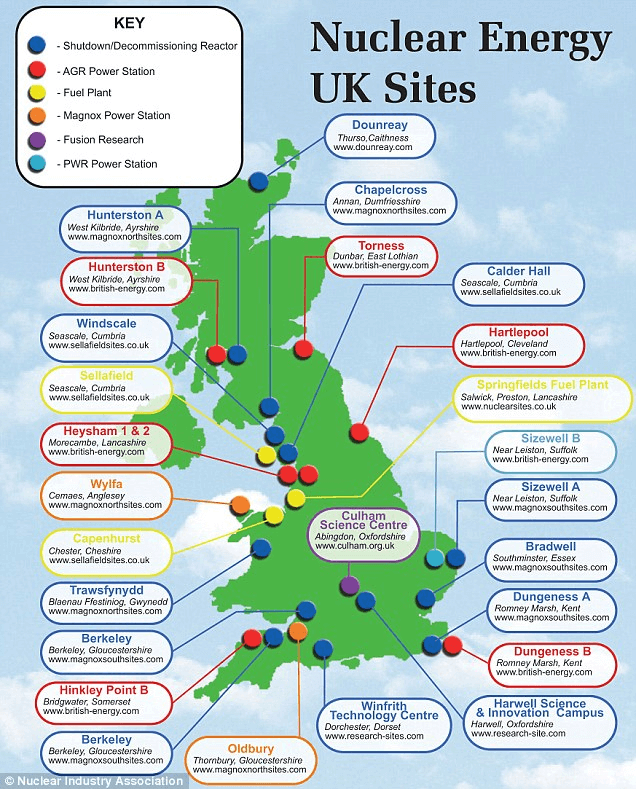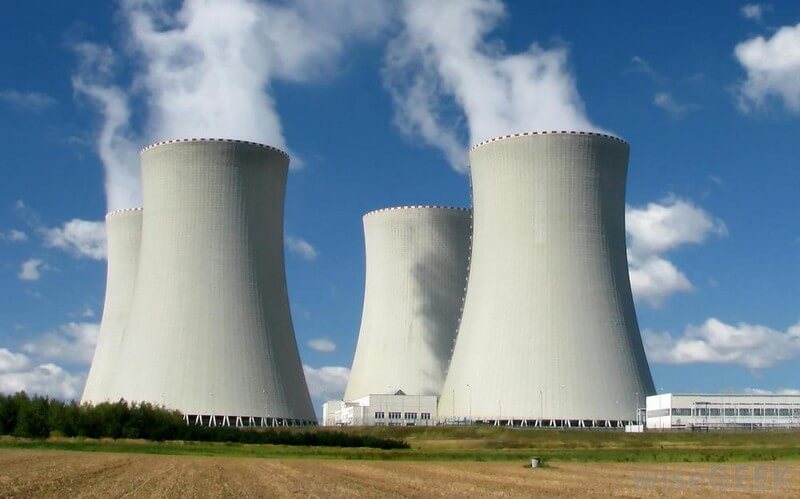Nuclear reactors have been a part of Britain’s power solution since the mid-1950s. In fact, the United Kingdom was the first country in the world to create a civil nuclear program when the power station in Windscale, England was constructed in 1956.
Today, nuclear power is responsible for approximately a quarter of the country’s electricity.
British use of nuclear energy reached its highest level in in 1997, when 26% of the county’s electricity came from nuclear power. Currently, the UK has 15 reactors, but nearly half of their capacity is slated for retirement by 2025.
Types of Nuclear Reactors in Britain

From 1956 to 1973, commercial reactors were gas-cooled Magnox systems. During the 1970s and ‘80s, seven advanced gas-cooled reactors (AGRs) were constructed.
This map shows the current location and type of all nuclear sites in the UK, including Shutdown/Decommissioned sites, AGR Power Stations, Fuel Plants, Magnox Power Stations, Fusion Research facilities, and PWR Power station.
First on-line in February 1995, the power station constructed at Sizewell in Suffolk is the only Pressurized Water Reactor (PWR), the type used in the majority of the world’s nuclear power plants. Two experimental reactors operated by the Atomic Energy Authority have been closed, one heavy water reactor at Winfrith, and one fastbreeder reactor (FBR) at Dounreay.
Power/Nuclear Reactors Operating in the UK
| Plant | Type | Present capacity (MWe net) | First power | Expected shutdown |
| Dungeness B 1&2 | AGR | 2 x 520 | 1983 & 1985 | 2028 |
|---|---|---|---|---|
| Hartlepool 1&2 | AGR | 595, 585 | 1983 & 1984 | 2024 |
| Heysham I 1&2 | AGR | 580, 575 | 1983 & 1984 | 2024 |
| Heysham II 1&2 | AGR | 2 x 610 | 1988 | 2030 |
| Hinkley Point B 1&2 | AGR | 475, 470 | 1976 | 2023 |
| Hunterston B 1&2 | AGR | 475, 485 | 1976 & 1977 | 2023 |
| Torness 1&2 | AGR | 590, 595 | 1988 & 1989 | 2030 |
| Sizewell B | PWR | 1198 | 1995 | 2035 |
| Total: 15 units | 8883 MWe | |||
Public Safety Concerns over Nuclear energy
Nuclear energy has long been a safety concern for the public. The early 1990s saw widespread concern in the United Kingdom when a disturbing concentration of leukemia cases occurred near some power plants. There were questions about these nuclear facilities’ effect on unborn children. However, in 2003, the Committee on Medical Aspects of Radiation in the Environment (COMARE) determined that there was no evidence of raised childhood cancer near nuclear power plants.
Public opinion about nuclear energy has shifted over the years. A 2002 opinion poll by MORI showed significant support for wind power over nuclear energy if the costs were the same. In November 2005, a poll conducted by Deloitte disclosed that 36% of the UK population supported using nuclear power, and that 62% supported a combination of nuclear energy and renewable technologies.
A 2010 survey determined that the public was again unsure about nuclear power. Most UK citizens expressed that their concerns about government regulation of nuclear power and the nuclear industry in general were relatively low, but still showed a preference for renewable energy sources over nuclear power.
In 2011, catastrophic events in Japan, which were caused by a tsunami, stoked public fears about nuclear power safety. In the wake of the Fukushima nuclear disaster, another national opinion poll revealed that support for nuclear power in the UK had dropped by twelve percent.
Historically, seismic activity in the UK was not been of great concern. Although earthquakes occur, they typically do not cause damage to structures that were built using modern construction techniques. Analysis of past earthquakes shows that it is unlikely that the UK will experience an earthquake large enough to cause harm. Furthermore, tsunamis rarely impact the UK, with very few identified in the geologic history of the country.
The UK government has made public safety concerns a high priority. They engaged the Office for Nuclear Regulation to examine lessons that could be learned from the Fukushima disaster in Japan, specifically. A report by Dr. Mike Weightman in 2011 concluded that the causes of the disaster in Japan were extreme and outside the realm of concern for the UK, going on to suggest that the UK should not cease the operation of nuclear power plants or other nuclear facilities.
The public’s fear faded quickly, and by July 2012, 63% of poll respondents said that nuclear power should remain part of the UK’s energy solution.
The Future of Nuclear Energy in the UK
The need for carbon-free energy has caused UK governments to approve construction of new nuclear power plants. But despite the British Government allowing private suppliers to plan construction of up to eight new nuclear power plants, in 2011, the Scottish Government disallowed the construction of any new nuclear power stations. And in early 2012, two major players, E.ON UK and RWE npower, decided to abstain from developing new nuclear power plants, a move that caused many to doubt the future of nuclear energy in the UK.
There were also tough new assessment processes introduced that restricted new reactor designs and plant locations. This combined with economic factors related to the UK energy market has made it difficult to obtain the major capital investments needed for new reactor construction.
Undaunted, EDF Energy is building four new reactors at two sites, there is activity from Horizon Nuclear Power in Wylfa and Oldbury, and there is approval for the construction of Chinese-designed reactors on the site of the Bradwell nuclear power station. The plan is for 19 GWe of new-generation plants to exist by 2025.
Despite safety concerns, public opinion in Britain has remained generally positive regarding nuclear power, and governmental support is strong. Nuclear power will likely play a critical role in ensuring that Britain can rely on the low carbon energy supplies it needs.
Sources:
http://www.cyberphysics.co.uk/topics/nuclear/nuclear_power_plant.html
https://www.energy-uk.org.uk/energy-industry/nuclear-generation.html
http://www.world-nuclear.org/information-library/country-profiles/countries-t-z/united-kingdom.aspx
https://en.wikipedia.org/wiki/Nuclear_power_in_the_United_Kingdom
Image source: https://www.moroccoworldnews.com/2016/05/187552/morocco-not-planning-to-construct-nuclear-power-plant/

